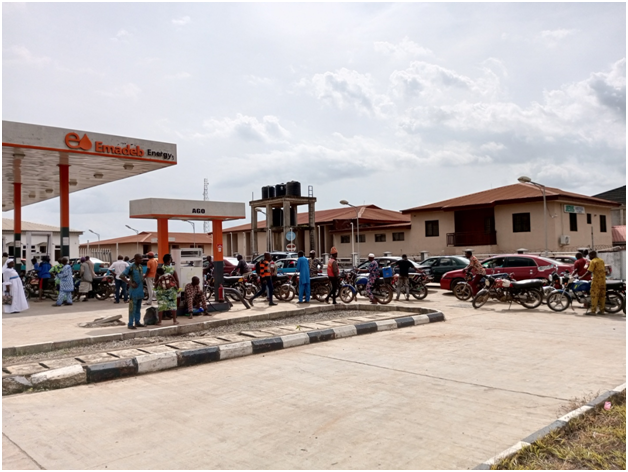Beyond the use of charcoal for fuel
By Adetokunbo Abiola
At Oda, in Akure South Local Government Area, a nurse with two children, Mrs Bolanle Ade, holds a bowl of charcoal with care, oblivious of its choky smell, a smile lighting up her face. In the times of yore, she would have been ashamed to be seen using charcoal to cook, but now, she does not care about this, holding the bowl to her waist as she brushes her teeth with a chewing stick.
“I have stopped using gas for cooking and adopted the use of charcoal, sawdust, and firewood. The price of gas is too expensive. I don’t want to starve my children through the use of gas, “she said.
The hike in gas prices started in April, when gas per kilogramme rose from between N280 and N300 to N750. Currently, 20 tonnes of gas is sold for more than N9.5 million as against N4 million sold before the hike. A 12.5 kg cylinder of gas is sold at N9,300 as against N8,500 two weeks ago. Consequently, many residents of Ondo State have jettisoned the idea of using gas for cooking, preferring the use of charcoal, despite the dangers in it.
Speaking few months ago, Olaosebikan Roselyn, a resident of Akure, said she uses charcoal for cooking as “it is cheaper than using gas”. She explained that the price of a bag of charcoal, which would last for a month or two, is N2000, “whereas a 12.5kg cylinder of gas which will barely last for a month costs N3, 800.”
In September 2021, the Nigerian States with the highest average refilling price for cooking gas (LPG) were Zamfara, Kano, and Sokoto. In Zamfara, five kilograms refilling reached N3,000.00. On the other hand, states that reflected the lowest refilling price for the same amount of LPF refilling were Lagos, Edo, and Osun. Prices in those states were estimated around roughly N2,000.00. It’s not surprising people have gravitated to using charcoal for cooking, despite the dangerous implications.
“Charcoal has been the most preferred fuel in the country, because gas is costly, kerosene is scarce and power supply is erratic in Nigeria,” says Stephen Aina, senior conservation officer at non-profit Nigerian Conservation Foundation.
Some known charcoal depots are found in places like Oyo, Iseyin, Saki, Igbo-Ora, Ogbomoso- all in the south west. Depots also exist in Jebba, Omu Aran, Egbe, Kabba in the central states. Charcoal is found in abundance also in Minna, Jos, and Kaduna. According to Centre for International Forestry Research, charcoal is Africa’s primary energy source for at least 70% of households, the major source of energy in rural areas both for domestic uses in small-scale traditional industries and commercial enterprises. Due to its production and distribution, it contributes the national balance of payments at the macro level as foreign exchange to some countries. In Nigeria, the wood charcoal enterprise is one of the major components of the wood fuel industry, and it is the main source of domestic fuel in urban areas, accounting for more than half of the domestic energy consumption. Unfortunately, the use of charcoal comes at a price.
The International Centre for Energy, Environment, and Development (ICEED) said 93,000 Nigerians die annually as a result of smoke inhaled while cooking with firewood, with women and children as the most affected persons. It also said that at least 450,000 Nigeria women will die from cooking with firewood or charcoal in five years if an alternative method of cooking is not introduced at an affordable rate.
“The production of charcoal is one of the activities leading to destruction of forest cover in Nigeria, a situation aggravated by illegal commercial logging,” said G.Y. Jamala, in the journal of Agriculture and Veterinary Science. “FAO indicates that between 1990 and 2005, Nigeria lost 35.7% of its forest cover, and only 12.2% of the country’s land is currently forested, while 350,000 hectares of land in the country are lost to desertification annually.”
In addition, charcoal production comes with the felling of both mature and nearly mature trees in almost all the areas involved in this business, with experts saying that Nigerians must wake up if they hope to mitigate the effects of global climatic change. At this rate, experts warn, the nation will lose all its forests by 2047. The prime reason for this is Nigeria’s growing appetite for charcoal—a cheap source of energy produced through pyrolysis, or burning of wood under high temperature in the absence of air.
Still people persist in the use of charcoal. A consumer, Memunat Ibrahim, said she preferred charcoal to other means of cooking because of its affordability.
“I cannot afford gas or kerosene that will finish before, finish making pap. I resorted to buying charcoal and it serves me longer,” she said
A resident of Ondo, Mrs. Omowumi Olugbenga, lamented to The Hope recently that the constant increment in the price of cooking gas has forced her into adopting the use of firewood and sawdust to make sure that she is able to cater for her family’s cooking needs without wasting all their resources on gas.
Experts say if the nation concentrates on solar energy, perhaps it would be able to stop people from using charcoal.
Subhojit Goswami is an expert who writes for Down To Earth. He avers that government should be looking at exploiting solar energy, since it has failed at making Nigerians stop using charcoal.
“The country needs policy measures to promote solar energy and energy-efficient cook stove. While focus on renewable is a right step forward, its success will largely depend on whether the country can sensitise the people to embrace it,”
The Executive Director of the National Centre for Genetic Resource and Biotechnology (NACGRAB), Dr Sunday Aladele, said that “charcoal production is depleting the forest,” urging the government has to wake up and checkmate the trend. “We are killing the future of the country. Necessary legal enforcement must be done by the government,” he said.
Aladele called on the government to be proactive enough to stem the trend of tree felling by using law enforcement agencies to clamp down on illegal forest exploration. Whether this will work, at a time of rising gas prices, is anyone’s guess.










